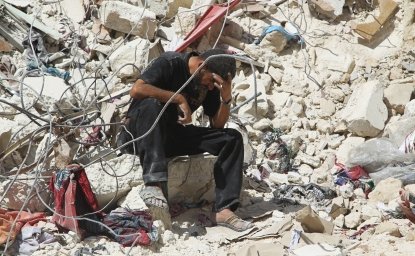Peace conferences are usually good for two things: starting a credible process or ending one. What’s happening in Geneva, ostensibly aimed at stopping the conflict in Syria, lacks sufficient buy-in from key parties to produce either result. (John Kerry’s admonition Sunday that those attending should not squander their opportunity reflects his, not their, commitment to the process.)
Much has been said about the scale of Syrians’ suffering: the millions displaced and the starvation conditions of those who remain. All that hurting, however, is not enough to force the kind of stalemate required by those who are fighting to facilitate a breakthrough toward a cease-fire or political transition.
After five years of egregious suffering by the Syrian people, the prospect of a sustainable end state is grim at best. Any successful negotiation needs coherent parties who will deliver, a basis for an accord, and mediators with real leverage. For all the international attention to Geneva, the conflict in Syria has none of the above.
Too many Syrian parties lack organization, coherent positions, or basic legitimacy. As Aron Lund and others have observed, there is not a monolithic Syrian opposition but many different groups. Some of the most effective of the armed groups that have been doing much of the fighting and dying aren’t involved in Geneva. Others, such as the Syrian Kurds, are supported by one external power (Russia) and opposed by another (Saudi Arabia).
In the face of this dysfunction, Bashar al-Assad‘s regime has an enormous advantage: Its representatives know what they do and don’t want. Russia’s military intervention in Syria in recent months, targeting the opposition, has made up for the regime’s manpower shortages and stopped the decline in its military position. It would not be surprising if the Assad regime is prepared to make some deals, such as prisoner exchanges, in an effort to buy time for it to appear like a reasonable actor in the peace process while the opposition’s divisions are on full display. It is to the regime’s advantage to keep the process going essentially nowhere. Much has been said about the scale of Syrians’ suffering: the millions displaced and the starvation conditions of those who remain. All that hurting, however, is not enough to force the kind of stalemate required by those who are fighting to facilitate a breakthrough toward a cease-fire or political transition.
The U.S. doesn’t appear willing to invest enough resources in either objective. Washington has no real leverage to force Iran or Russia to help; if anything, the nuclear accord with Iran has given Tehran the upper hand.
Meanwhile, outside forces are too self-interested and agenda-driven to create momentum for a solution. Russia, Iran, Saudi Arabia, Turkey, and the U.S. have all signed on to the Geneva process. That’s both the good and bad news. From inside the tent, Russia is able to promote its priorities of keeping Mr. Assad in power and preventing the U.S. from dictating a solution and/or getting rid of another Russian ally (as it feels Washington did with Saddam Hussein and Moammar Qadhafi). For its part, Iran needs Mr. Assad and his Alawite minority in power to avoid being encircled by Sunnis, and Mr. Assad allows Iran access to Lebanon and Hezbollah, a Shiite ally. Turkey cares more about ensuring the Kurds don’t consolidate their power in Syria than about hitting ISIS or Mr. Assad. No single thing would get all of these parties on the same page. One might think that Russia would want an exit strategy from Syria, but President Vladimir Putinhas not yet appeared to seek one.
The Obama administration has less than a year to do something meaningful and avoid accusations that it didn’t do enough to stop the slaughter in Syria. In 2013, former State Department policy planning director Anne-Marie Slaughter warned that Syria could be Barack Obama’s Rwanda. She wasn’t the first to suggest it. Defeating ISIS–an unlikely outcome in any event–has taken precedence over removing Mr. Assad, whose barbarism, the administration has argued, ensures ISIS’s staying power. The U.S. doesn’t appear willing to invest enough resources in either objective. Washington has no real leverage to force Iran or Russia to help; if anything, the nuclear accord with Iran has given Tehran the upper hand.
At this juncture, a civil war with a political process–however Kabuki-like–is better than an ongoing conflict without one.
U.N. special envoy Staffan de Mistura has said the talks could go for six months. By the looks of things he’ll need more time to make a significant change. A national cease-fire that would allow all parties to concentrate on beating ISIS or a political transition to remove Mr. Assad are fantastical notions. Anything that produces small cease-fires, humanitarian relief, and prisoner exchanges would be a miracle. At this juncture, a civil war with a political process–however Kabuki-like–is better than an ongoing conflict without one.
The opinions expressed here are solely those of the author.
This article was originally published in the Washington Wire blog.



